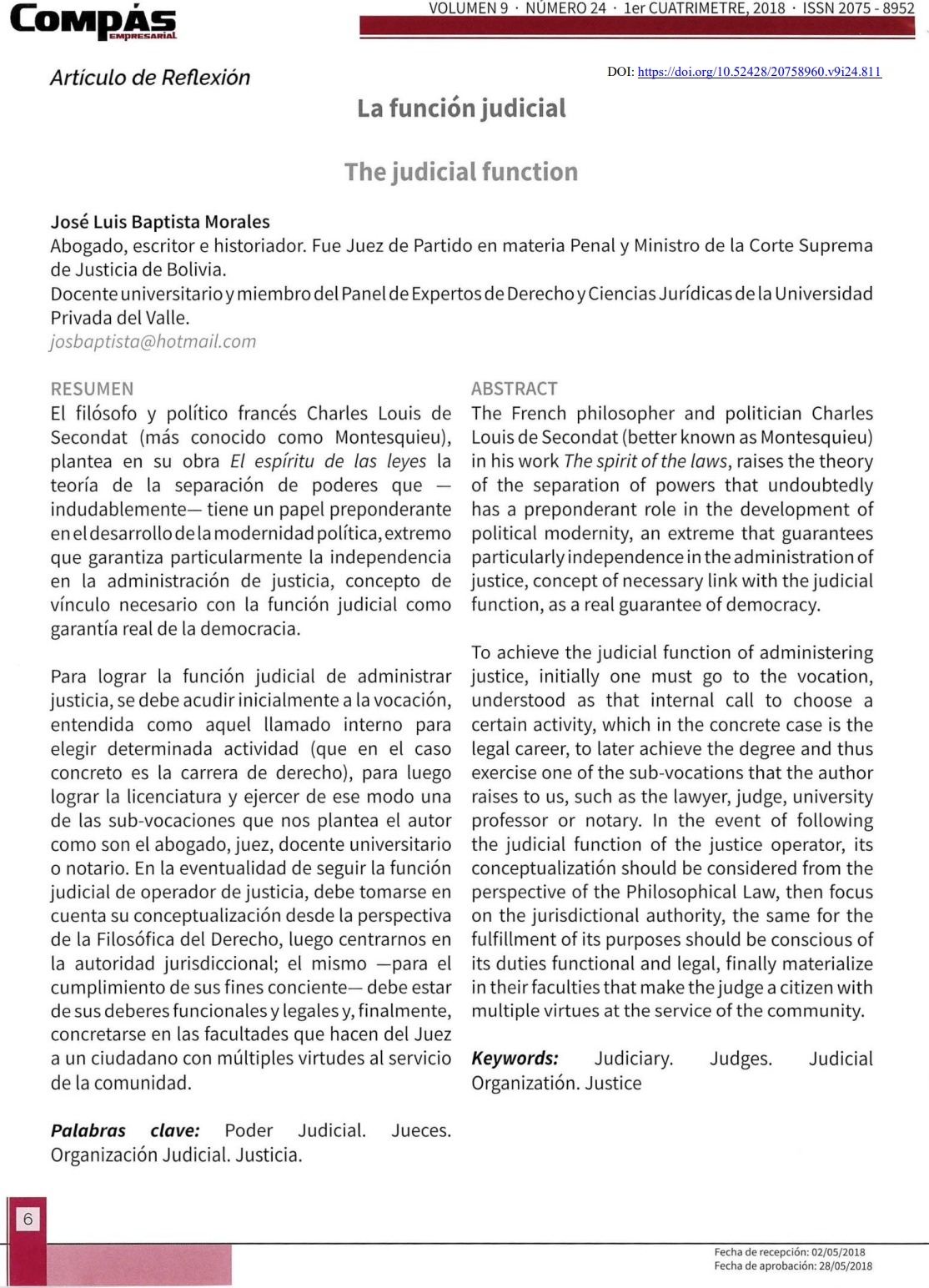The Judicial Function
DOI:
https://doi.org/10.52428/20758960.v9i24.811Keywords:
Judiciary, Judges, Judicial Organizatión, JusticeAbstract
The French philosopher and politician Charles Louis de Secondat (better known as Montesquieu) in his work The spirit of the laws, raises the theory of the separation of powers that undoubtedly has a preponderant role in the development of política! modernity, an extreme that guarantees particularly independence in the administration of justice, concept of necessary link with the judicial function, as a real guarantee of democracy. To achieve the judicial function of administering justice, initially one must go to the vocation, understood as that interna! call to choose a certain activity, which in the concrete case is the legal career, to later achieve the degree and thus exercise one of the sub-vocations that the author raises to us, such as the lawyer, judge, university professor or notary. In the event of following the judicial function of the justice operator, its conceptualizatión should be considered from the perspective of the Philosophical Law, then focus on the jurisdictional authority, the same for the fulfillment of its purposes should be conscious of its duties functional and legal, finally materialize in theirfaculties that make the judge a citizen with multiple virtues at the serví ce of the community.
Downloads
References
Ley de Organización Judicial (1993). Ley 1455 de 18 de febrero de 1993. Artículo 7°. Bolivia: Gaceta Oficial de Bolivia.
Ley del Notariado Plurinacional (2014). Ley 483 de 25 de enero de 2014. Artículo 13'. Bolivia: Ministerio de Justicia y Transparencia institucional.
Gordillo, A. A. (1997). El Método en Derecho. Madrid, España: Editorial Civitas, S.A.
Ossorio, A. (1956). El Alma de la Toga. Buenos Aires, Argentina: Ediciones Jurídicas Europa-América.
Mendoza, F. (1998). Diccionario Usual de Latín Jurídico. La Paz, Bolivia: Offset Druck & Co.
Ribera, L. (1958). Historia de la Abogacía. Santa Cruz, Bolivia: Revista 1 del Colegio de Abogados.
Goldschmidt, W. (1986). La Ciencia de la Justicia. Buenos Aires, Argentina: Ediciones Depalma.
Dromi, J.R. (1984). El Poder Judicial. Mendoza, Argentina: Editorial Ciudad Argentina.
Alvarado, A. (1983). El Juez, sus Deberes y Facultades. Buenos Aires, Argentina: Ediciones Depalma.
González, P. (1993). Independencia del Juez y Control de su Actividad. Valencia, España: Editorial Tiran! lo Blanch.
Brody R. (1991), La Independencia de Jueces. Lima, Perú: Comisión Andina de Juristas.
Charles de Secondat, Barón de Montesquieu(l984). El Espíritu de las Leyes. Madrid, España: Editorial Sarpe.
Constitución Política del Estado (1826). Constitución Política del 19 de noviembre de 1826. Artículo 10. Chuquisaca, Bolivia: Imprenta de la Universidad.
Poder Judicial de Bolivia (2007). Discursos de los Presidentes 1827-1927. Sucre, Bolivia: Editorial Judicial.
Paz, L. (1910). La Corte Suprema de Justicia - Su Historia y su Jurisprudencia. Sucre, Bolivia: Imprenta Bolívar.
Poder Judicial-Instituto de la Judicatura. (2003). Perfil del Juez Boliviano. Sucre, Bolivia: Editorial Judicial.

Downloads
Published
How to Cite
Issue
Section
License
Copyright (c) 2018 José Luis Baptista Morales

This work is licensed under a Creative Commons Attribution 4.0 International License.
Authors who publish with this journal agree to the following terms:
- Authors retain copyright and grant the journal right of first publication with the work simultaneously licensed under a Creative Commons Attribution License 4.0 that allows others to share the work with an acknowledgement of the work's authorship and initial publication in this journal.
- Authors are able to enter into separate, additional contractual arrangements for the non-exclusive distribution of the journal's published version of the work (e.g., post it to an institutional repository or publish it in a book), with an acknowledgement of its initial publication in this journal.
- Authors are permitted and encouraged to post their work online (e.g., in institutional repositories or on their website) prior to and during the submission process, as it can lead to productive exchanges, as well as earlier and greater citation of published work.









